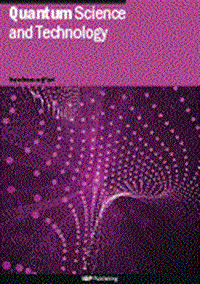Quantum algorithm for polaritonic chemistry based on an exact ansatz
IF 5.6
2区 物理与天体物理
Q1 PHYSICS, MULTIDISCIPLINARY
引用次数: 0
Abstract
Cavity-modified chemistry uses strong light-matter interactions to modify the electronic properties of molecules in order to enable new physical phenomena such as novel reaction pathways. As cavity chemistry often involves critical regions where configurations become nearly degenerate, the ability to treat multireference problems is crucial to understanding polaritonic systems. In this Letter, we show through the use of a unitary ansatz derived from the anti-Hermitian contracted Schrödinger equation that cavity-modified systems with strong correlation, such as the deformation of rectangular H4 coupled to a cavity mode, can be solved efficiently and accurately on a quantum device. In contrast, while our quantum algorithm can be made formally exact, classical-computing methods as well as other quantum-computing algorithms often yield answers that are both quantitatively and qualitatively incorrect. Additionally, we demonstrate the current feasibility of the algorithm on near intermediate-scale quantum hardware by computing the dissociation curve of H2 strongly coupled to a bosonic bath.基于精确ansatz的极化化学量子算法
空腔修饰化学利用强烈的光-物质相互作用来改变分子的电子特性,以实现新的物理现象,如新的反应途径。由于空腔化学通常涉及到结构几乎简并的关键区域,因此处理多参考问题的能力对于理解极化系统至关重要。在这篇文章中,我们通过使用由反厄米缩Schrödinger方程导出的统一解析,证明了在量子器件上可以高效、准确地求解具有强相关性的空腔修饰系统,例如耦合到空腔模式的矩形H4的变形。相比之下,虽然我们的量子算法可以在形式上精确,但经典计算方法以及其他量子计算算法通常会产生定量和定性不正确的答案。此外,我们通过计算H2与玻色子槽强耦合的解离曲线,证明了该算法目前在近中尺度量子硬件上的可行性。
本文章由计算机程序翻译,如有差异,请以英文原文为准。
求助全文
约1分钟内获得全文
求助全文
来源期刊

Quantum Science and Technology
Materials Science-Materials Science (miscellaneous)
CiteScore
11.20
自引率
3.00%
发文量
133
期刊介绍:
Driven by advances in technology and experimental capability, the last decade has seen the emergence of quantum technology: a new praxis for controlling the quantum world. It is now possible to engineer complex, multi-component systems that merge the once distinct fields of quantum optics and condensed matter physics.
Quantum Science and Technology is a new multidisciplinary, electronic-only journal, devoted to publishing research of the highest quality and impact covering theoretical and experimental advances in the fundamental science and application of all quantum-enabled technologies.
 求助内容:
求助内容: 应助结果提醒方式:
应助结果提醒方式:


